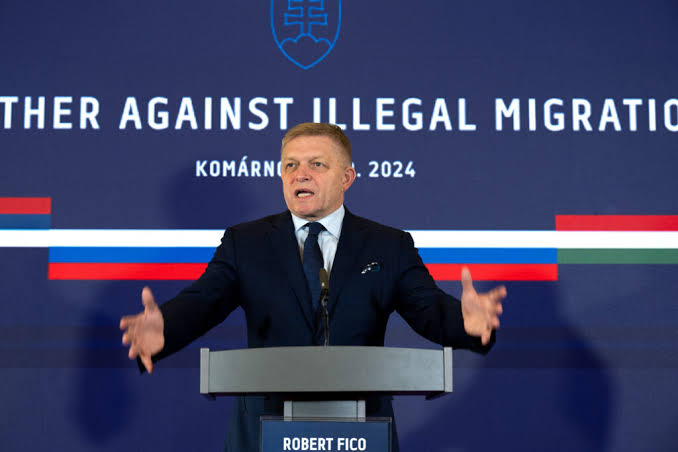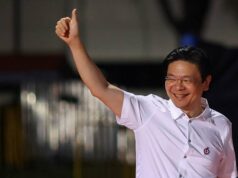Zelensky accuses Slovak PM of undermining European unity

By Jennifer Hicks
Ukrainian President Volodymyr Zelensky has sharply criticized Slovak Prime Minister Robert Fico, accusing him of aiding Russian President Vladimir Putin by continuing to import Russian gas.
The accusation, made on December 23, highlights growing tensions between Ukraine and Slovakia over energy dependence on Russia and its geopolitical implications.
Zelensky took to social media platform X to express his disapproval, stating that European Union leaders had observed Fico’s reluctance to reduce Slovakia’s reliance on Russian energy.
“Implying that he wants to help Putin earn money to fund the war and weaken Europe,” Zelensky wrote, adding, “We believe that such assistance to Putin is immoral.”
The remarks underscore Ukraine’s frustrations with nations that remain tied to Russian energy supplies despite the ongoing war.
The crux of the issue lies in Slovakia’s heavy dependence on Russian gas, which has been a critical component of its energy needs.
Fico’s recent visit to Moscow, unannounced until after its conclusion, further fueled suspicions about his government’s stance on Russia amid EU efforts to reduce energy dependence on Moscow.
Slovakia’s reliance on Russian gas has placed it in a precarious position. With the current contract for gas transit through Ukraine set to expire on December 31, Slovakia faces the prospect of losing a vital energy supply route.
Zelensky has made it clear that Ukraine will not renew the contract with Russia, leaving Slovakia to explore alternative energy solutions or risk significant supply disruptions.
Kremlin spokesman Dmitry Peskov acknowledged the seriousness of the situation, describing it as a “very difficult” matter requiring “increased attention.”
This highlights the interconnected nature of energy politics in the region and the challenges of balancing national interests with broader European energy policies.
Prime Minister Fico’s visit to Moscow on December 22-his first since taking office-sparked widespread criticism. As the leader of a NATO and EU member state, Fico’s decision to engage directly with Putin is seen as a departure from the bloc’s collective efforts to isolate Moscow diplomatically and economically following its invasion of Ukraine in 2022.
In a statement posted on his Facebook account after the meeting, Fico said the talks were prompted by Zelensky’s opposition to the transit of Russian gas through Ukraine to Slovakia.
According to Fico, Putin confirmed Russia’s willingness to continue supplying gas to Slovakia and other Western nations, albeit with the caveat that such transit would become “practically impossible” after January 1, 2025.
Fico’s statement did not provide further details on how Russia plans to maintain these supplies or what agreements might replace the current transit arrangements.
The lack of transparency has added to concerns about Slovakia’s energy strategy and its alignment with EU objectives.
Energy dependence on Russia has been a contentious issue for European nations, particularly since the start of the war in Ukraine.
The EU has implemented a series of measures aimed at reducing reliance on Russian energy, including sanctions, diversification of energy sources, and investments in renewable energy.
However, Fico’s approach reflects the challenges faced by smaller nations like Slovakia, where economic and logistical constraints make rapid shifts in energy policy more difficult.
Slovakia’s energy predicament also underscores the broader vulnerabilities within the EU’s energy security framework, particularly for member states heavily reliant on Russian gas.
The meeting between Fico and Putin also included discussions on the ongoing war in Ukraine and the potential for a “peaceful” resolution.
While Fico’s statement emphasized dialogue and the possibility of an early end to the conflict, it starkly contrasts with Ukraine’s stance, which prioritizes complete territorial sovereignty and the cessation of Russian aggression.
Fico’s willingness to engage with Moscow has drawn criticism from other EU leaders who view such overtures as undermining collective European efforts to hold Russia accountable. It also raises questions about Slovakia’s commitment to EU sanctions and its alignment with NATO’s strategic priorities.
Zelensky’s accusation against Fico highlights deeper divisions within the EU and NATO regarding how to handle Russia. While the majority of member states have supported sanctions and efforts to reduce energy dependence, Fico’s actions reflect a more pragmatic-or opportunistic-approach that prioritizes immediate national interests over long-term regional stability.
This divide has significant implications for European unity, particularly as the EU faces mounting challenges in maintaining a cohesive strategy against Russia.
The issue of energy security remains a critical fault line, with countries like Slovakia advocating for continued engagement with Moscow to secure supplies, while others push for a complete severance of ties.
For Ukraine, the stakes are high. The expiration of the gas transit contract represents an opportunity to weaken Russia’s economic leverage over Europe.
However, it also risks alienating nations like Slovakia that depend on these supplies. Zelensky’s strong rhetoric against Fico reflects Ukraine’s frustration with perceived wavering among its European allies.
As the EU seeks to navigate these challenges, the need for a unified energy strategy becomes increasingly urgent.
Diversifying energy sources, investing in infrastructure, and fostering greater cooperation among member states are essential steps to reduce dependence on Russia and ensure energy security for all.
The dispute between Zelensky and Fico underscores the complex interplay between energy politics and geopolitics in Europe.
While Ukraine seeks to rally its allies against Russia, Slovakia’s reliance on Russian gas reveals the practical challenges of aligning national interests with collective European goals.
As the deadline for the gas transit contract approaches, the situation remains fluid. Whether Slovakia can secure alternative energy sources or continues its engagement with Russia will have far-reaching implications for European energy security and the broader geopolitical landscape.




